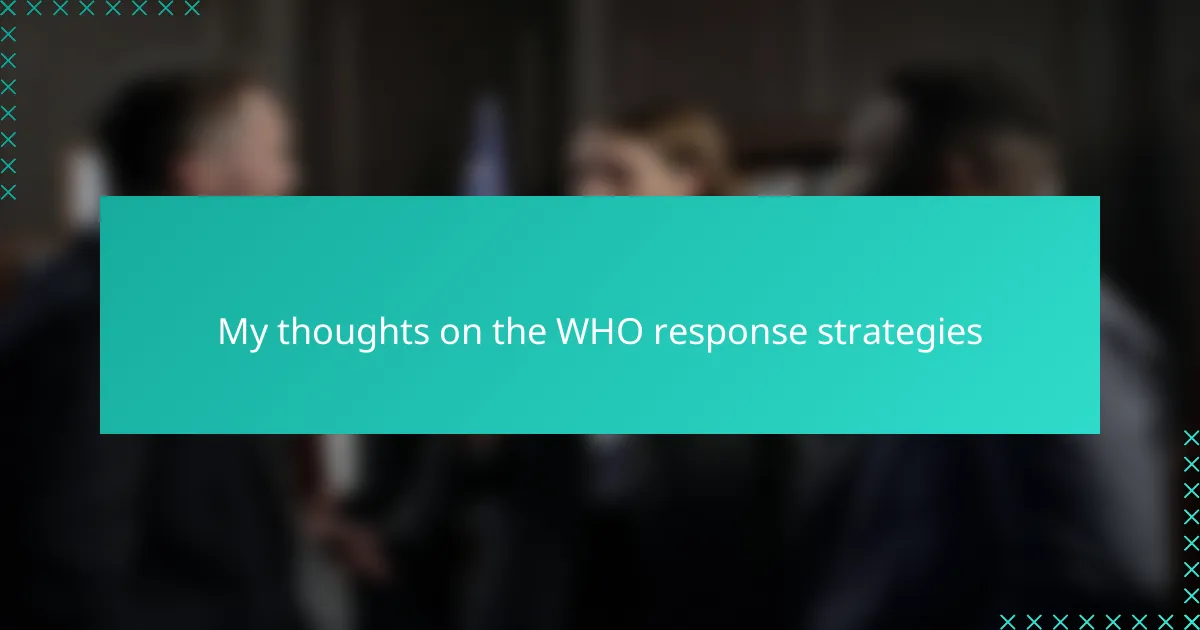Key takeaways
- The WHO employs a multi-layered strategy that emphasizes immediate action alongside long-term health system strengthening, though real-world applications often face delays and uneven cooperation.
- Principles of equity, solidarity, and sustainability are crucial in global health policies, yet achieving true cooperation among nations remains a challenge.
- The WHO serves as a bridge between science and diplomacy, but its political influence is sometimes limited by national interests and bureaucratic processes.
- Recommendations for improvement include enhancing transparency in communication, streamlining decision-making, and investing in local health systems to build resilience before crises occur.
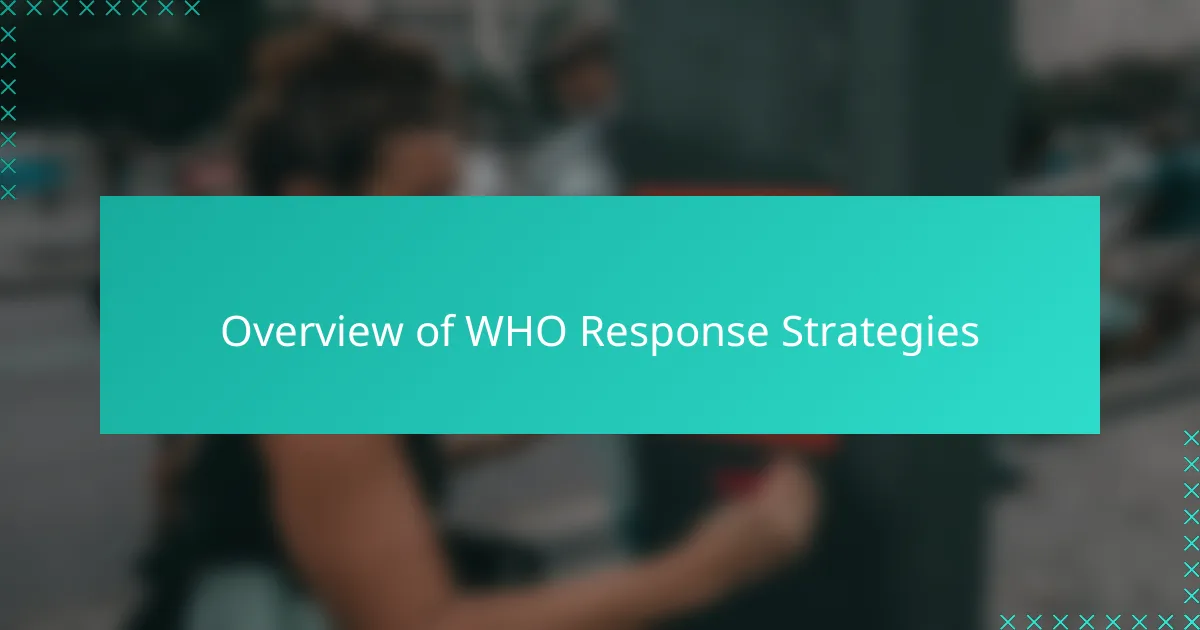
Overview of WHO Response Strategies
When I reflect on the WHO’s response strategies, what strikes me most is their multi-layered approach—balancing immediate action with long-term health system strengthening. It’s not just about reacting to an outbreak; it’s about building frameworks that anticipate and mitigate future crises. Have you ever wondered how those strategies translate on the ground, especially in regions with limited resources?
From my experience following global health initiatives, the WHO prioritizes coordination among member states, scientific guidance, and rapid information dissemination. This triad often feels like the backbone that holds emergency responses together, yet it also reveals the challenges of navigating political landscapes. I can’t help but admire their attempt to remain neutral and science-driven amid such complex dynamics.
Still, there’s an emotional weight in observing how these strategies play out. While the technical plans seem robust, real-world application often stumbles over delays and uneven cooperation. It makes me question, how might we enhance transparency and trust during those critical moments when lives depend on swift, decisive action?
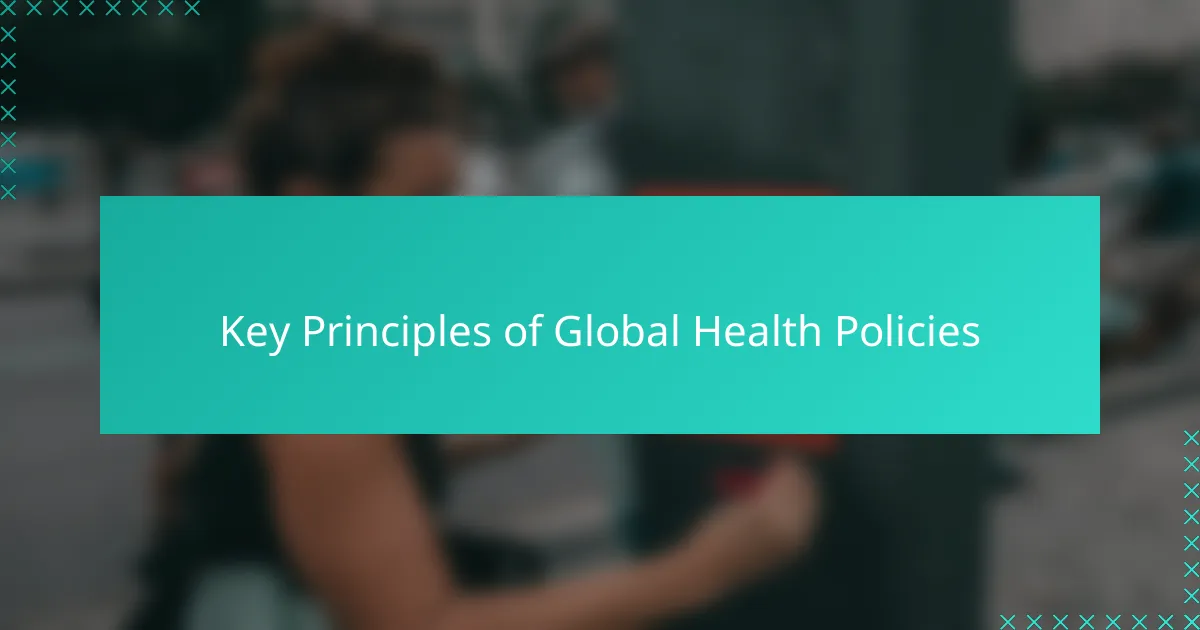
Key Principles of Global Health Policies
Global health policies rest on principles like equity, solidarity, and sustainability. I find equity especially compelling—it’s about ensuring everyone, no matter where they live or how wealthy, has access to essential health services. It makes me think about the vast disparities I’ve seen in health outcomes when these principles fall short.
Solidarity is another cornerstone that resonates with me deeply. Global health challenges don’t respect borders, so cooperation among countries isn’t a choice but a necessity. I often wonder: can politics ever truly align with this ideal, or will national interests always complicate collective action?
Sustainability completes the trio, reminding us that health interventions must endure beyond immediate crises. Reflecting on past outbreaks, I’ve noticed that short-term fixes rarely lead to lasting change. It’s like building a house on sand unless policies embed resilience and continuous improvement.
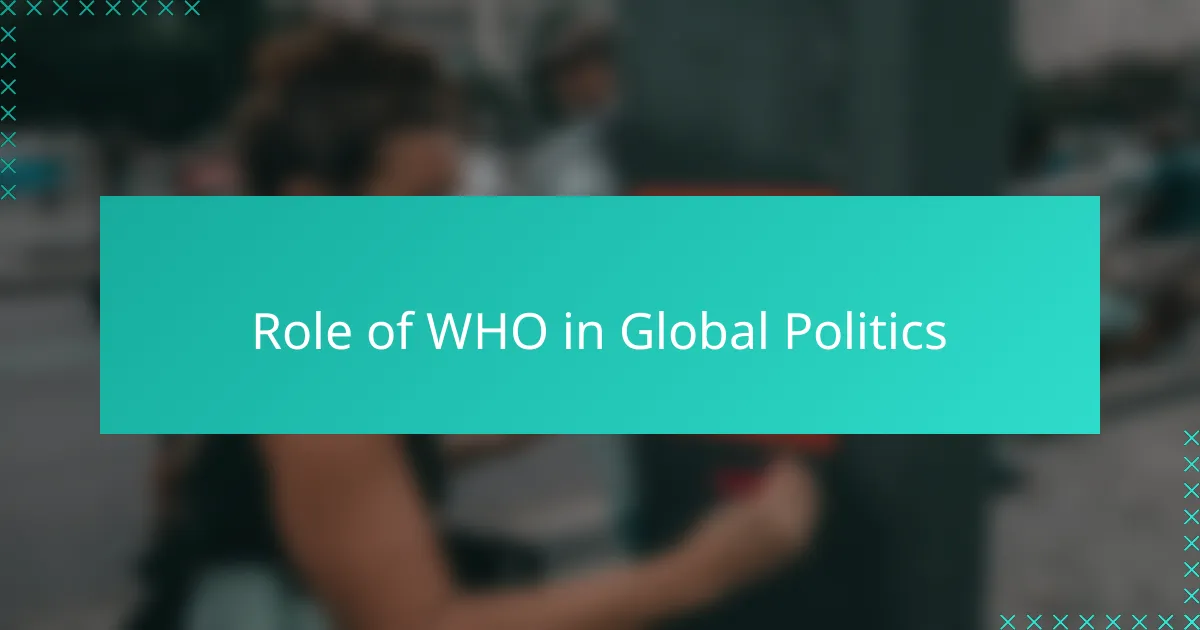
Role of WHO in Global Politics
When I think about the WHO’s role in global politics, it strikes me as a unique bridge between science and diplomacy. The organization doesn’t just issue health guidelines; it navigates the delicate balance of international relations, trying to unite countries with often competing interests. Have you noticed how challenging it must be to maintain neutrality while addressing health crises that are inherently political?
From my perspective, WHO acts as a crucial convenor at the global table, where health intersects with economic and security concerns. I’ve followed moments when their influence extended beyond medicine—shaping policies, fostering cooperation, and even mitigating tensions. It’s fascinating how health can serve as common ground in the often fractious arena of global politics.
Still, I sometimes ask myself if the WHO’s political power matches its technical expertise. Despite its respected voice, the organization can only act within the limits set by sovereign states. This constraint makes me wonder: how can the WHO evolve to play a more assertive role without compromising its impartiality?
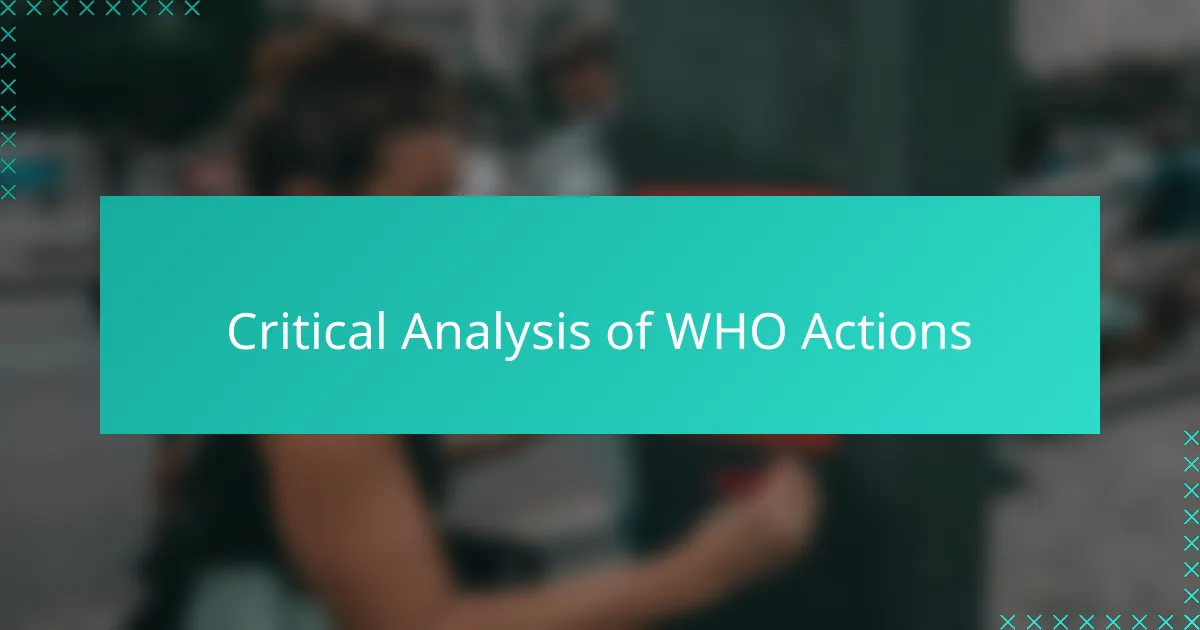
Critical Analysis of WHO Actions
When I critically examine the WHO’s actions, I can’t ignore the tension between their commendable intentions and the frustrating delays that sometimes mar their response. It feels like a constant battle against bureaucratic inertia, which reminds me of moments I’ve witnessed when urgent decisions were slowed by endless consultations. Doesn’t it make you wonder how many lives could be saved if those processes were streamlined?
From what I’ve seen, transparency is a recurring pain point. The WHO often wrestles with balancing sensitive political relationships and the need for open communication. This delicate dance sometimes clouds the clarity of their messaging, leaving both governments and the public uncertain about what to trust. Have you ever struggled to make sense of official updates because the information felt too cautious or vague?
Yet, despite these challenges, I find it impossible to dismiss the WHO’s efforts to galvanize global cooperation in crises. Their role is undeniably complex—they’re not only responding to diseases but also managing an intricate web of political interests. Reflecting on this, I’ve come to appreciate that their actions are as much about diplomacy as they are about health, which often means progress comes in cautious, uneven steps rather than sweeping victories.
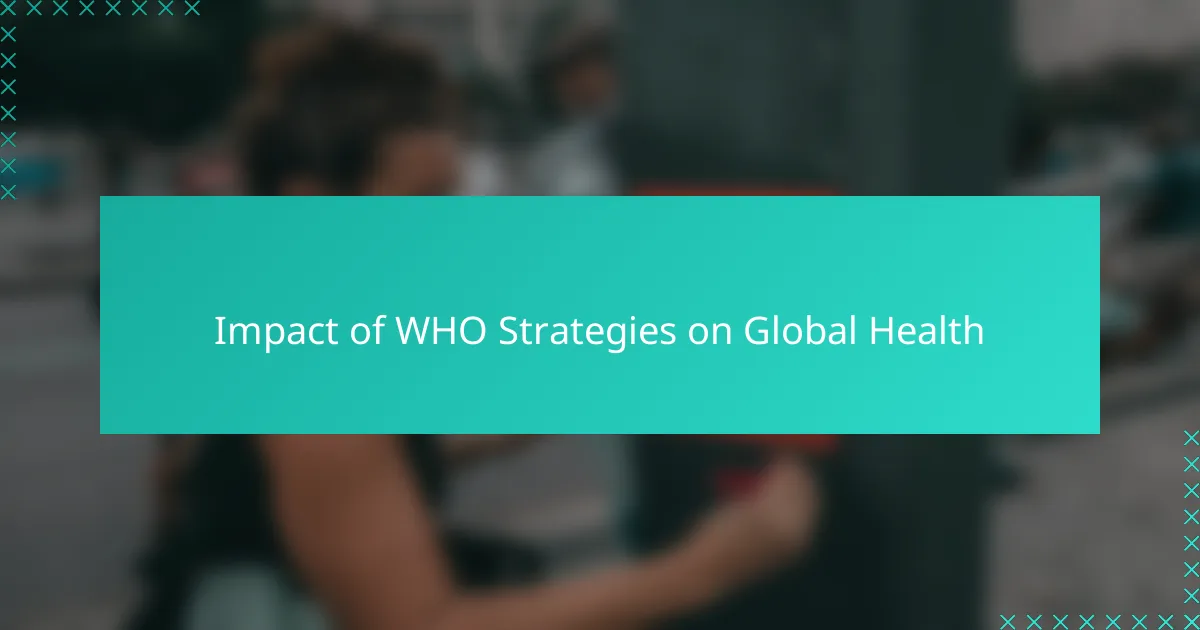
Impact of WHO Strategies on Global Health
When I consider the impact of WHO strategies on global health, I’m both hopeful and cautious. Their coordinated efforts have undeniably improved responses to pandemics, saving countless lives through timely guidelines and resource mobilization. But I also think about the uneven reach of these benefits—why do some regions still struggle despite these global frameworks?
It’s hard not to feel the tension between ambition and reality. From my perspective, WHO’s push for equitable vaccine distribution, for instance, was a landmark move. Yet, watching richer countries secure doses ahead of vulnerable populations made me question how much influence these strategies truly have over national priorities.
Still, I believe these strategies have laid essential groundwork. They foster collaboration and build resilience that didn’t exist before. Sometimes progress is slow, and setbacks occur, but isn’t it encouraging to see a global entity striving to turn scattered efforts into a coherent, life-saving force?
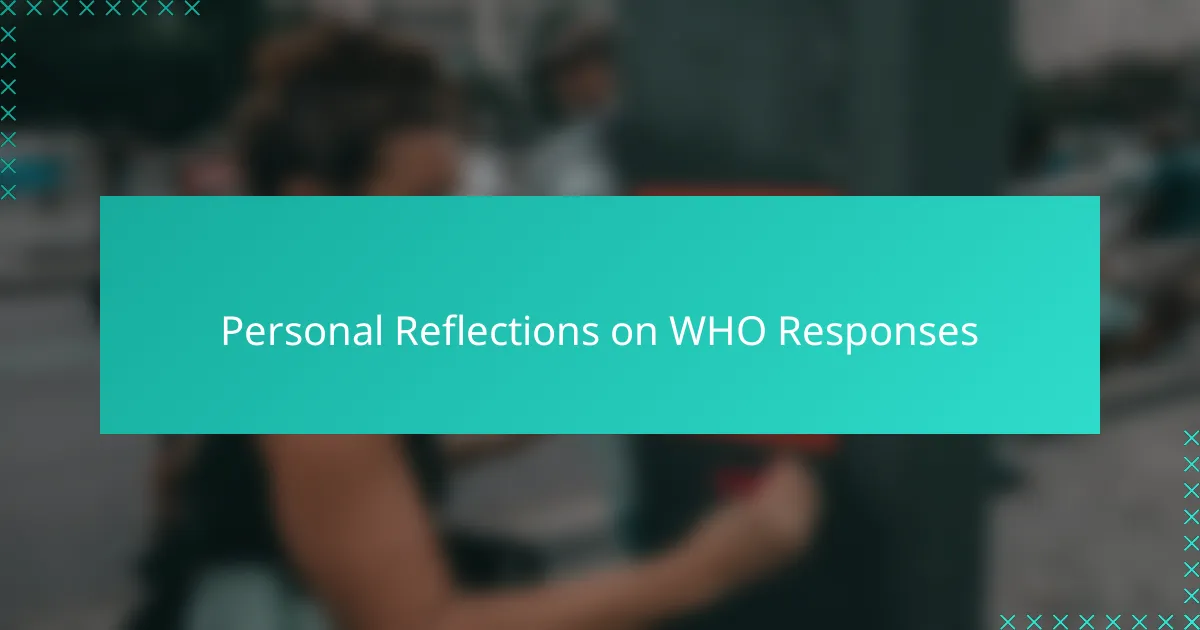
Personal Reflections on WHO Responses
Reflecting personally on the WHO’s responses, I often feel a mix of admiration and frustration. There were moments during recent outbreaks when their swift guidance seemed like a beacon of hope—but then delays and mixed messaging would creep in, tempering that optimism. It’s made me wonder: how much pressure does the WHO face behind the scenes, trying to balance urgency with diplomacy?
From my experience observing these processes, the human element stands out. I recall following a crisis where health workers on the ground expressed both gratitude and exasperation toward the WHO’s directives—grateful for the support but frustrated by bureaucratic hurdles. This tension highlights a broader challenge: how can such a large institution maintain agility without sacrificing thoroughness?
At the core, I think the WHO embodies a kind of hopeful resilience despite its flaws. It’s easy to critique from afar, but knowing the complexity they navigate makes me appreciate their efforts even more. Still, I can’t help but ask myself how we, as a global community, might better support the organization so it can act faster and with greater clarity when the stakes are life and death.
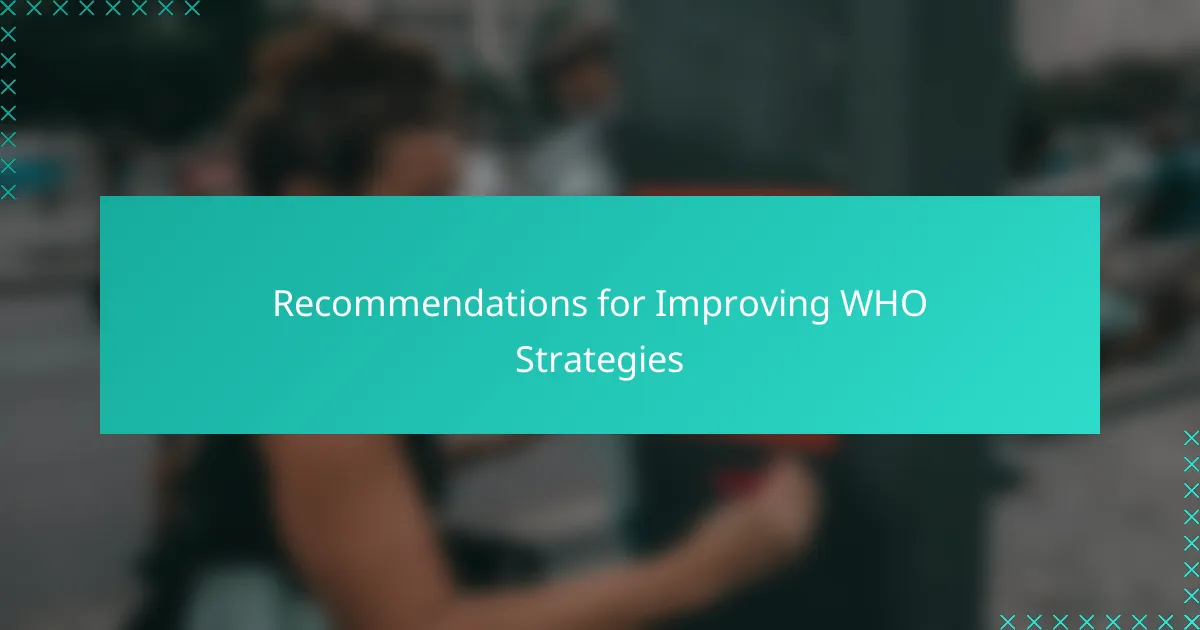
Recommendations for Improving WHO Strategies
One recommendation I keep coming back to is the need for greater transparency in WHO communications. From my vantage point, clearer and more timely information could reduce confusion and build trust—not just among governments but with the public too. Have you ever noticed how uncertainty breeds anxiety during crises? I believe the WHO could do more to cut through that fog by sharing candid updates, even when the news isn’t perfect.
Another area I think deserves more attention is streamlining decision-making processes. In my experience, bureaucratic layers often slow down critical responses, which is frustrating when every hour counts. Could the WHO experiment with more agile frameworks that empower rapid, on-the-ground action without sacrificing accountability? It’s a tough balance, but I sense it’s essential for saving more lives.
Lastly, I feel the WHO should invest more in strengthening local health systems before crises hit. Reflecting on past outbreaks, I’ve seen how fragile infrastructure limits how well global strategies translate into real impact. What if the WHO paired its guidance with sustained support for training and resources in vulnerable regions? To me, that approach feels like planting seeds for resilience rather than scrambling to patch problems after they explode.
